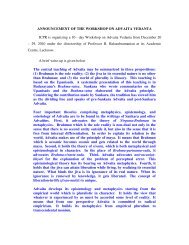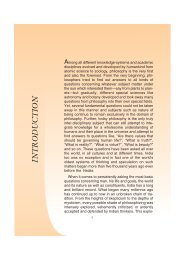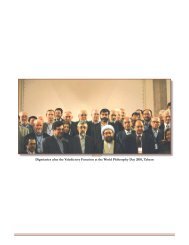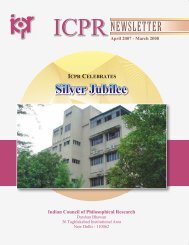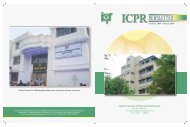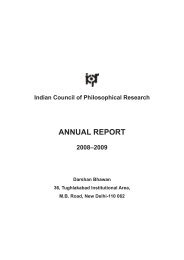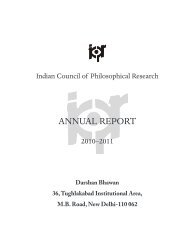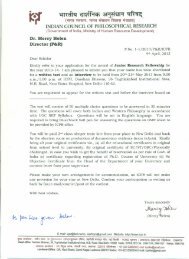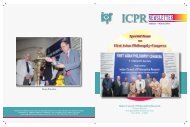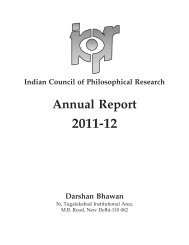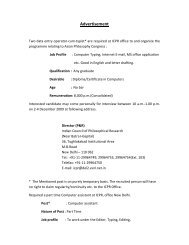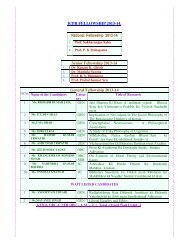ICPR NEWSLETTER 4 - Indian Council of Philosophical Research
ICPR NEWSLETTER 4 - Indian Council of Philosophical Research
ICPR NEWSLETTER 4 - Indian Council of Philosophical Research
Create successful ePaper yourself
Turn your PDF publications into a flip-book with our unique Google optimized e-Paper software.
<strong>ICPR</strong><br />
April<br />
Newsletter<br />
- September 2009<br />
<strong>Indian</strong> <strong>Council</strong> <strong>of</strong> <strong>Philosophical</strong> <strong>Research</strong>, Academic Centre, Lucknow<br />
Published by the Member-Secretary, <strong>ICPR</strong>, 36, Tughlakabad Institutional Area, Mehrauli-Badarpur Road, (Near Batra Hospital),<br />
New Delhi-62, Tel : 29964753, 29964754 Fax: 29964750. E-mail : icpr@del2.vsnl.net.in Website: www.icpr.in<br />
Layout, Design and Printing by Datagraph Creations Pvt. Ltd., Tel : 27221409, 47019171 Fax : 47091473<br />
<strong>Indian</strong> <strong>Council</strong> <strong>of</strong> <strong>Philosophical</strong> <strong>Research</strong><br />
Darshan Bhawan<br />
36 Tughlakabad Institutional Area<br />
New Delhi - 110062
Chairman, Pr<strong>of</strong>. K. Ramakrishna Rao cutting the ribbon,<br />
inaugurating the New Premises <strong>of</strong> Academic Centre, Lucknow
From Member-Secretary's Desk<br />
vacate its incomparably beautiful and grand premises at<br />
Butler Palace. We are now very hopeful that the Academic<br />
Centre will get re-vitalised very quickly and all its<br />
activities will return to their former and well-deserved<br />
glory <strong>of</strong> the unforgettable Butler Palace days.<br />
his issue <strong>of</strong> Newsletter from April to September<br />
2009 comprises <strong>of</strong> a period during which we<br />
could not have the active participation <strong>of</strong> our T<strong>Council</strong> Members since the previous <strong>Council</strong> was<br />
dissolved upon completing its term in March 2009, but<br />
the new <strong>Council</strong> was not immediately constituted by<br />
the Ministry. I would be failing in my duty if I do not<br />
duly and gratefully acknowledge that all the Members<br />
<strong>of</strong> the previous <strong>Council</strong> were quite helpful and supportive<br />
<strong>of</strong> all our activities and extended their very hearty<br />
and full cooperation for the betterment and development<br />
<strong>of</strong> <strong>Council</strong>. I thank all <strong>of</strong> them from the bottom <strong>of</strong><br />
my heart.<br />
However, the above six months under report have<br />
witnessed quite a large number <strong>of</strong> activities, routine as<br />
well as new, which were undertaken as part <strong>of</strong> the<br />
<strong>Council</strong>'s objective <strong>of</strong> furthering its programs and<br />
projects. One <strong>of</strong> the major achievements <strong>of</strong> this period<br />
in the direction <strong>of</strong> which we had been working for<br />
several months was to get finalised by the Lucknow<br />
Development Authority (LDA) the allotment for<br />
occupation the new building at Vipul Khand, Gomti<br />
Nagar, thus very successfully relocating the Academic<br />
Centre at Lucknow. It must be said that it was our good<br />
fortune that the building allotted to us By LDA had<br />
been planned and designed to house a library. The<br />
Academic Centre has been functioning from its new<br />
premises for the past couple <strong>of</strong> months.<br />
There is no doubt that this shifting to the new premises<br />
has resulted in the Lucknow Academic Centre getting<br />
an absolutely fresh lease <strong>of</strong> life after a painfully long<br />
dislocation, a sort <strong>of</strong> vanvas, when it had been forced to<br />
I am indeed very happy to place on record the very<br />
sincere, untiring and hard work put in by several <strong>of</strong> my<br />
colleagues at both the <strong>of</strong>fices in Delhi and Lucknow for<br />
achieving this relocation <strong>of</strong> the Lucknow Centre. I<br />
would like to make a special mention here <strong>of</strong> the most<br />
invaluable help rendered by Shri Krishna Kumar Verma<br />
and Ms. Preeti Chandra <strong>of</strong> Lucknow <strong>of</strong>fice who gladly<br />
did everything within their power to help the <strong>Council</strong>'s<br />
<strong>of</strong>fice to finalise the agreement with LDA besides also<br />
helping in the enormous task <strong>of</strong> the shifting <strong>of</strong> the<br />
Library. The technical committee comprising <strong>of</strong><br />
Pr<strong>of</strong>essors Roop Rekha Verma, Roshan Raina and Mr.<br />
R.P. Singh, executive Engineer, LDA, deserves special<br />
mention here for working very meticulously for<br />
providing us with very useful suggestions for renovation,<br />
partition, addition <strong>of</strong> facilities and such other<br />
matters before shifting to make the newly acquired<br />
building most suitable and useful for our Library as well<br />
as the Academic Centre. I record my sincere thanks to<br />
all <strong>of</strong> them for sparing their valuable time, attention,<br />
help and sincere efforts.<br />
The new building at Vipul Khand, Gomti Nagar, was<br />
inaugurated on May 21, 2009, by our Chairman<br />
Pr<strong>of</strong>essor K. Ramakrishna Rao in the presence <strong>of</strong> the<br />
elite <strong>of</strong> Lucknow and the Fellows <strong>of</strong> <strong>ICPR</strong>, with<br />
Pr<strong>of</strong>essor R. Balasubramanian, the former Chairman <strong>of</strong><br />
<strong>ICPR</strong>, presiding over this event. The inaugural<br />
function was followed by a Fellows' Meet at Academic<br />
Centre up to May 24, 2009, in which eminent philosophers<br />
<strong>of</strong> the country participated and interacted with<br />
the Senior as well as Junior <strong>Research</strong> Fellows <strong>of</strong> the<br />
<strong>Council</strong>.<br />
On the Fellowship front, the National Fellowship for<br />
the year 2009-10 was awarded to Pr<strong>of</strong>essor Srinivasa<br />
Rao, a very well known scholar in <strong>Indian</strong> Philosophy,<br />
who will be working on his project: “The Philosophy<br />
<strong>of</strong> Swami Satchidanandedra Saraswati”.<br />
1
Before concluding this brief note, I would like to<br />
announce the unique event <strong>of</strong> the First Asian Philosophy<br />
Congress which is scheduled to be held in JNU<br />
during March 6-9, 2010. This is going to be an event<br />
which is first <strong>of</strong> its kind and it is planned to hold this<br />
Congress perpetually in different parts <strong>of</strong> Asia in the<br />
coming years. It is proposed to have its permanent<br />
Secretariat in Delhi. The <strong>Council</strong>'s aim in taking up the<br />
sponsorship <strong>of</strong> this Congress in cooperation with<br />
several other organizations is to create a forum for<br />
discussing specifically the Asian world-views and<br />
philosophies peculiar and specific to different countries<br />
in the continent <strong>of</strong> Asia. Dozens <strong>of</strong> scholars from<br />
different Asian countries will be participating in the<br />
deliberations and it will be providing a wonderful<br />
opportunity for scholars in India to meet and interact<br />
with their counterparts in different Asian countries and<br />
forge useful networks.<br />
The Asian Philosophy Congress is an opportunity for<br />
all our philosophers and we hope that they will strive to<br />
make the very best use <strong>of</strong> this very unique opportunity.<br />
I extend a cordial invitation to all those who are interested<br />
in Philosophy to participate in this event.<br />
G. Mishra<br />
Forthcoming Publication<br />
2
Chairman's Address<br />
All That Ends Well Is Well!<br />
ince its establishment twenty-eight years ago, the<br />
<strong>Indian</strong> <strong>Council</strong> <strong>of</strong> <strong>Philosophical</strong> <strong>Research</strong> came a<br />
long way. From a small <strong>of</strong>fice at the residence <strong>of</strong> Sthe Chairman, it has grown into a vibrant organization<br />
with its headquarters in an impressive multi-storey<br />
structure in New Delhi and an Academic Center at<br />
Lucknow. The Butler Palace in Lucknow, where the<br />
Academic Center was located, was an envy <strong>of</strong> our sister<br />
institutions. Befitting the splendor <strong>of</strong> the historic<br />
palace, the <strong>ICPR</strong> created a library collection, which<br />
came to be recognized as one the best in this part <strong>of</strong> the<br />
world, attracting scholars from all over the country and<br />
beyond. The Center soon became a vibrant entity<br />
bristling with all sorts <strong>of</strong> academic activities – conferences,<br />
seminars, workshops and refresher programs.<br />
Alas! Following the Supreme Court judgment a few<br />
years ago, the Center became homeless as it were and<br />
was forced to hurriedly move and function from<br />
congested rented premises, which had no more room<br />
than just enough space to store the books. Consequently,<br />
much <strong>of</strong> the academic activity had to be<br />
curtailed. The Academic Center at Lucknow existed<br />
more in name, resting on its past laurels than on the<br />
current service.<br />
This was the pitiable condition and a truly appalling<br />
and sorry state <strong>of</strong> affairs that greeted me when I took<br />
charge as the Chairman. In a sense it was a panic<br />
situation. Not knowing how to go about it for a quick<br />
resolution <strong>of</strong> the problem I wrote to the Governor <strong>of</strong><br />
UP His Excellency Shri Rajeswara Rao because it was<br />
the enlightened initiative <strong>of</strong> one <strong>of</strong> his predecessors His<br />
Excellency Shri Sir C.P.N. Singh that resulted in the<br />
establishment <strong>of</strong> the Academic Center at the Butler<br />
Palace. He graciously responded; and I rushed to<br />
Lucknow to confer with him. We discussed various<br />
options and explored with the Vice-Chancellors <strong>of</strong><br />
universities situated in Lucknow if they could provide<br />
the land for building suitable structures for the Center.<br />
Several trips to Lucknow and meetings with the<br />
concerned people yielded no positive results. Our<br />
letters to the UP Government also had no desired<br />
response. The elections and change <strong>of</strong> Governments in<br />
UP did not help either.<br />
I had no choice but share my frustrations with the<br />
HRD Ministry. The Hon’ble Minister Shri Arjun<br />
Singhji was quick to respond. He took the initiative and<br />
wrote to the Hon’ble Chief-Minister <strong>of</strong> Uttar Pradesh.<br />
This was followed up by the <strong>of</strong>ficers at the HRD,<br />
especially Shri Sunil Kumar, who contacted the appropriate<br />
<strong>of</strong>ficers in the UP Government. This provided us<br />
the window we were looking for. We wasted no time; I<br />
and the Member-Secretary rushed to Lucknow and met<br />
the concerned <strong>of</strong>ficials, who received us graciously.<br />
Pr<strong>of</strong>essor Roop Rekha Verma, a member <strong>of</strong> the <strong>ICPR</strong><br />
<strong>Council</strong> nominated by the UP Government, joined us.<br />
We presented the case <strong>of</strong> <strong>ICPR</strong> and pleaded for help<br />
from the UP Government, which has the moral<br />
responsibility to provide us with a suitable place for<br />
locating the Academic Center.<br />
To our delight, the leadership in the UP Government<br />
rose to the occasion, shared our concerns and took<br />
immediate steps to meet the long and short term needs<br />
<strong>of</strong> the Academic Center. Short term, it was agreed that<br />
the <strong>ICPR</strong> would be given a newly constructed library<br />
3
uilding currently available to facilitate immediate<br />
moving <strong>of</strong> the Academic Center into it. Long term, the<br />
<strong>ICPR</strong> is <strong>of</strong>fered a site nearly seven acres in an area being<br />
developed by the Lucknow Urban Development<br />
Authority. The UP Government will share the cost <strong>of</strong><br />
the land; and the <strong>ICPR</strong> will build permanent facilities<br />
for expanded activities <strong>of</strong> the Academic Center in<br />
Lucknow. We at the <strong>ICPR</strong> are pr<strong>of</strong>oundly grateful for<br />
all those who made this possible.<br />
The future <strong>of</strong> the Academic Center in Lucknow is now<br />
assured. The <strong>ICPR</strong> is ready to meet its obligations. We<br />
already took steps to transfer a Director from the New<br />
Delhi <strong>of</strong>fice to head the Lucknow Center. Several lakh<br />
rupees were spent to decorate and make the building<br />
functional for the research library and to organize the<br />
<strong>of</strong>fices in the new building.<br />
The <strong>ICPR</strong> has proposals to establish regional centers<br />
and a national Institute <strong>of</strong> Philosophy. With the new<br />
infrastructure in place in the promised site, Lucknow<br />
would have a compelling claim for one <strong>of</strong> these. We,<br />
Chairmen and Member-Secretaries, come and go; but<br />
what we were able to achieve during our short stints in<br />
<strong>of</strong>fice shall remain. The revived, rekindled and revitalized<br />
Lucknow Center would surely be a memorable<br />
event to cherish for me personally.<br />
Teaching <strong>of</strong> philosophy in India is increasingly coming<br />
under strain. The subject itself is becoming a<br />
marginalized, lackluster discipline. Good students with<br />
genuine interest in the subject are not attracted to our<br />
programs. The faculty sizes are gradually shrinking in<br />
many older universities. Fewer newer universities have<br />
plans to teach philosophy courses. All this is happening<br />
because, I believe, philosophy as studied and researched<br />
is increasingly seen as irrelevant to national needs, issues<br />
and challenges. To survive in these difficult times and<br />
make philosophy regain its respectable place in <strong>Indian</strong><br />
academia, there is an urgent need for imaginative<br />
leadership at different levels, especially at the <strong>ICPR</strong><br />
dedicated as it is for promoting philosophy in the<br />
country.<br />
Mindful <strong>of</strong> this responsibility, we at the <strong>ICPR</strong> have in<br />
recent years attempted to focus on the applied and<br />
interdisciplinary aspects <strong>of</strong> the subject and to encourage<br />
research on such topics as violence, identity and applied<br />
ethics. We have prepared long term research projects<br />
that would make philosophy relevant to national needs.<br />
These projects are now pending with the Planning<br />
Commission and the HRD Ministry. I expect that these<br />
proposals would receive the attention and support they<br />
deserve. When this happens, the <strong>ICPR</strong> would be a step<br />
closer to its assigned role <strong>of</strong> being the think tank <strong>of</strong> the<br />
nation.<br />
The problem <strong>of</strong> marginalization <strong>of</strong> philosophy in<br />
universities and colleges is not something peculiar to<br />
India alone. The predicament is experienced almost<br />
universally. It is acutely felt even in the economically<br />
advanced countries like USA. This is one <strong>of</strong> the reasons<br />
why during the past quarter <strong>of</strong> a century, many applied<br />
philosophy centers have come into existence around<br />
the world. This move to embrace applied philosophy is<br />
somewhat alien to Western philosophical tradition,<br />
which prides itself as being essentially a theoretical<br />
discipline. Recall, for example, how Edmund Husserl<br />
mocked at Eastern philosophies as fostering an attitude<br />
<strong>of</strong> application, <strong>of</strong> setting practical goals and tending to<br />
promote mythical and religious mindset. In the<br />
classical <strong>Indian</strong> tradition, philosophy indeed was<br />
unashamedly practical and applied. Yet, its contributions<br />
to philosophy are no less significant. Application<br />
need not be in the spiritual arena. It could be as much<br />
secular today as it was religious during the classical<br />
period.<br />
Let me emphasize again, how important it is that we<br />
philosophers go interdisciplinary. First, applied<br />
philosophy is frequently interdisciplinary. Second, let<br />
us also not forget that philosophy is a wisdom discipline.<br />
Wisdom consists more in applying knowledge<br />
than in acquiring knowledge, and it is not piecemeal<br />
and fragmented, but holistic and unitary. Finally, let us<br />
recognize also that being interdisciplinary in our<br />
research efforts makes us no less philosophers as<br />
sometimes mistakenly thought. Ideas <strong>of</strong> far reaching<br />
philosophical significance came more out <strong>of</strong> the<br />
writings <strong>of</strong> Mahatma Gandhi and Sri Aurobindo than<br />
from those occupying pr<strong>of</strong>essorial chairs in our elite<br />
universities.<br />
I hope and trust that the initiatives taken by the <strong>ICPR</strong><br />
in recent years would continue and be further strengthened<br />
in future. I hope also that a new generation <strong>of</strong><br />
philosophers would spring up and light our national<br />
intellectual landscape, show the pathways for the<br />
country to march ahead and help defeat the divisive<br />
forces that threaten to fracture the unity and integrity <strong>of</strong><br />
the nation by exploiting caste, religion, region, and<br />
such other narrow identities. Let us all hope that the<br />
Academic Center <strong>of</strong> the <strong>ICPR</strong> at Lucknow with all its<br />
added facilities would stand as a significant resource to<br />
support and help usher in the change to come. After all<br />
the travails and turbulence, problems and frustrations,<br />
we now have reason to rejoice. All that ends well is well!<br />
Pr<strong>of</strong>essor K. Ramakrishna Rao<br />
Chairman, <strong>ICPR</strong><br />
4
New Addition to <strong>ICPR</strong> family<br />
Dr Sushim Dubey joined as Programme Officer <strong>of</strong><br />
<strong>ICPR</strong> on 24 July 2009. He got his Ph.D. from<br />
Rani Durgavati University, (formally Jabalpur University)<br />
Jabalpur, Madhya Pradesh. He has been faculty<br />
Gold medallist <strong>of</strong> the University and recipient <strong>of</strong><br />
fellowships <strong>of</strong> UGC (NET JRF) and <strong>ICPR</strong> (General<br />
Fellowship). He is computer savvy and has done the<br />
various digitalization works <strong>of</strong> <strong>Philosophical</strong> Sanskrit<br />
Texts. INDIA TODAY also has given a one full page<br />
coverage about the contributory computerized work <strong>of</strong><br />
Dr. Dubey.<br />
Inaugural Function<br />
Inaugural Function <strong>of</strong> Academic Centre and Library at Vipul Khand,<br />
Gomti Nagar, Lucknow<br />
Inaugural Function <strong>of</strong> the <strong>ICPR</strong> Academic Centre and<br />
Library was held at Vipul Khand, Gomti Nagar,<br />
Lucknow. It was followed by a colloquium <strong>of</strong> the<br />
Fellows <strong>of</strong> the <strong>Council</strong>.<br />
Since its inception, <strong>Indian</strong> <strong>Council</strong> <strong>of</strong> <strong>Philosophical</strong><br />
<strong>Research</strong> is having its Academic Centre and Reference<br />
Library at Lucknow. After its displacement from Butler<br />
Palace in 2005, the Centre was located in a rented<br />
accommodation provided by the PCF authorities.<br />
Recently, the U.P Government and Lucknow<br />
Development Authority have considered our request<br />
and allotted an accommodation for the Academic<br />
Centre and Library at Vipul Khand, Gomti Nagar,<br />
Lucknow.<br />
5
Inaugural Function <strong>of</strong> Academic Centre and Library,<br />
Lucknow<br />
Inaugural Function <strong>of</strong> Academic Centre and Library,<br />
Lucknow<br />
Academic Centre and Library, Lucknow<br />
An inaugural function <strong>of</strong> its new building was held on<br />
May 21, 2009. The function was followed by colloquium<br />
<strong>of</strong> the Fellows <strong>of</strong> the <strong>Council</strong>. The <strong>Council</strong><br />
Inaugural Function <strong>of</strong> Academic Centre and Library,<br />
Lucknow<br />
brought out a special Newsletter/Souvenir which will<br />
be circulated among the distinguished invitees at the<br />
inaugural function and to all the universities in India.<br />
<strong>ICPR</strong> Fellowships<br />
The <strong>Council</strong> awarded National Fellowship to<br />
Pr<strong>of</strong>essor Srinivasa Rao for the year 2009-2010.<br />
Pr<strong>of</strong>essor Rao retired from the Bangalore University as<br />
the Pr<strong>of</strong>essor and Head <strong>of</strong> Department <strong>of</strong> Philosophy.<br />
An authority in Advaita Vedanta and other schools in<br />
<strong>Indian</strong> Philosophy, Pr<strong>of</strong>essor Rao would be working on<br />
his on going project "The philosophy <strong>of</strong><br />
Satchidanandendra Saraswati" as a National fellow.<br />
Pr<strong>of</strong>essor Srinivasa Rao<br />
6
Other Fellowships<br />
Dr. Pankaj Srinivasa, Punjab University (Art,s Block-<br />
4), Chandigarh<br />
Consciousness and Language: A Critical Study with<br />
Special Reference to Vasubandhu and Dignaga.<br />
Senior Fellowships<br />
Senior Fellowship was awarded to Pr<strong>of</strong>essor Saroj<br />
Kumar Mohanty for working on his project Man &<br />
Nature: A study in the foundations <strong>of</strong> environmental<br />
Ethics.<br />
Ten General Fellows and thirty seven Junior <strong>Research</strong><br />
Fellows were selected for the year 2008- 2009 to work<br />
on different projects as given below:<br />
General Fellowships-2009-10<br />
Dr Vijay Tankha, B-1, St. Stephen's College, Delhi<br />
A Study <strong>of</strong> Plato's Republic<br />
Dr. Priyanka Shukla, Lucknow (UP)<br />
An appraisal <strong>of</strong> Serte's concept <strong>of</strong> 'other' in the light <strong>of</strong><br />
Buddhism and Advaita Vedanta.<br />
Atul Kumar Mishra, Allahabad<br />
Cultural Values <strong>of</strong> Globalization and Challenges <strong>of</strong> the<br />
Future World- A <strong>Philosophical</strong> Study<br />
Dr. Sheeja O.J., Kerala<br />
Pr<strong>of</strong>essor Saroj Kumar Mohanty<br />
The Hard and Harder Problems <strong>of</strong> Coconsciousness a<br />
Critical Approach and Evaluation.<br />
Mrs. Manjula Saxena, Delhi<br />
Bharatiya Soundrya Shastra ke Adhara Stambh.<br />
Ms. Nibedita Priyadarshini Jena, University <strong>of</strong><br />
Hyderabad, Hyderabad (AP)<br />
The Moral Status <strong>of</strong> Animals: A Comprative Study<br />
between Classical Western (Aristotle and stoics) and<br />
Classical <strong>Indian</strong> (Jainism & Buddhism) Philosophy<br />
Shri Sreekumar M., Calicut University, Malapuram<br />
Dist.Kerala<br />
The Process <strong>of</strong> 'Exclusion' in the apoha Theory <strong>of</strong> Dinnaga<br />
& the process <strong>of</strong> “Difference “in the sign Theory <strong>of</strong> F.O.<br />
Saussure: A Comparative Study.<br />
Shri Bhupendran K. Rathore, Kota (Rajasthan)<br />
Vaiœesika Darœana Ke Pramukha Prâmânika Granthon ke<br />
Sandarbha me pramânamañjarî kâ tulanâtmaka<br />
adhyayan.<br />
Dr. Mukesh Kumar Chaursia, Mahendru Patna-<br />
800006. (Bihar)<br />
Vedic Darshan Mein Manav Evam Pariyavaran : Ek<br />
Adhyayan<br />
Junior <strong>Research</strong> Fellowships -2009-10<br />
Ms. Archana Pattanaik, Bhubaneswar, Orissa<br />
Anthropocentrism in Environmental Ethics: A Critical<br />
study<br />
Mr. Sekh Farid, Banpur, Distt.-Khurda, Orissa<br />
Biomedical Ethics : <strong>Philosophical</strong> Exploration<br />
Mr. Manoj Kumar Guru, Dr. H.S. Gour University,<br />
Sagar (MP)<br />
Jayant Bhatt Krit Nyaymanjri Ke Anusar Boudh Darshan<br />
Ke Moolbhoot Sidhanto Ka Samikshatmak Adhyayan<br />
Mr. Sushil Kumar Gautam, Agra (UP)<br />
Development <strong>of</strong> Human Rights in <strong>Indian</strong> and Western<br />
Philosophy and its Relevance in Present time A <strong>Philosophical</strong><br />
study<br />
Mr. Roymon T.C., Mumbai-400 080 (Maharashtra)<br />
The Transcendental Idealist Method in Kant and<br />
Shankara: A Comparison<br />
Mr. Daya Ram Das, J.R. Rajasthan Sanskrit University,<br />
Jaipur (Raj)<br />
Ramananda Vedanta Sabda Sastrayoh Tatvamîmam-<br />
7
sayah Tulanstmakamanusilanam<br />
Mr. Ashok kumar Khatai, Puri, Orissa<br />
Managerial Ethics- An Analytical Study<br />
Mr. Navin Dixit, Hoshangabad, (M.P.)<br />
A Critical Study <strong>of</strong> Swami Vivekanand's Thoughts on the<br />
synthesis <strong>of</strong> Science and Spirituality<br />
Mr. Debjani Mukherjee, Visva Bharati, Santiniketan<br />
(WB)<br />
Capability Theory and its significance for Social Justice: A<br />
<strong>Philosophical</strong> Study.<br />
Mr. Narender Kumar, Sampurnanand University,<br />
Varanasi (UP)<br />
Nyayamadhva Darshanyoh Eshvarasyavadharnayoh<br />
Samikshanam.<br />
Ms. Karuna Sharma, G.K. University, Haridwar<br />
(Uttrakhand)<br />
Bhartiya Darshan Mein Dharm Evam Swadharma Ki<br />
Avadharna Ek Darshnik Vivechan.<br />
Ms Bhaswati De, P.S-Dakshin Dinajpur, West Bengal<br />
Intending Death: The Dilemmas <strong>of</strong> Mercy Killing : A<br />
Critical Observation.<br />
Ms. Sapna Gupta, Jaipur (Rajasthan)<br />
Bhartiya Darshan Me Vyakti Ke Swaroop per Vibhin<br />
Mato Ka Tulnatmak Vivechan<br />
Ms. Pooja Sharma, Rajasthan University, Jaipur<br />
(Rajasthan)<br />
Jain Poranik Sahitya Mein Antnirhit Mulyabodh : Ek<br />
Alochnatmak vishleshan<br />
Ms. Soma Dutta, University <strong>of</strong> North Bengal,<br />
Darjeeling (WB)<br />
Genetic Alterations : Some Ethical Concerns<br />
Ms. Pallavi, Patna (Bihar)<br />
Samajik Naitik Sampritiya Ke Roop Mein Mrituy Dand<br />
Ek Samikshatmak Adhyayan<br />
Mr. Himanshu Prakash Damle, Escande Center for<br />
<strong>Research</strong> in Religions & Culture,Pondichery<br />
French Theory Looks At Complexity Theory<br />
Mr. Sudhanshu Shekhar, Bhagalpur, Bihar<br />
Varn Vyavastha Aur Samajik Nyayay: Dr. Bhimrao<br />
Ambedkar Ke Vishesh Sandharb Mein.<br />
Shri Krishn Muraree Mani Tripathi, New Delhi<br />
Nyaya Sidanta Muktawalian Anuman Khandasya<br />
Dinkari Ramrudhri Tikyavimarsh<br />
Ms. Pushpa Yadav, Gorakhpur (UP)<br />
A Critical Study <strong>of</strong> New Humanism with Special Reference<br />
to M.N.Roy<br />
Mr. Chitta Ranjan Nayak, Dhenkanal, Orissa<br />
Man & Nature : Study on Environmental Ethics<br />
Md. Ali Ahmad Mansoori, Muzaffarpur, Bihar<br />
Bhartiya Praman Mimansa Mein Vyakti: Ek<br />
Vishleshnatmak Adhyayan<br />
Smt. Neetu Singh, Allahabad (UP)<br />
“Vigyapti Matratasidhi” : Ek Darshnik Anusheelan<br />
Mr. Amandeep Singh, Punjab University, Chandigarh<br />
Aesthetic Experience & Creativity (Pratibha) Historical<br />
Telos & Metaphysics<br />
Ms. Alpana Jaiswal, Varanasi (UP)<br />
Ishwarvadi Dharmon Mein Ashub Ki Samasya : Ek<br />
Samikshatmak Adhyayan Hindu, Christian Evam Islam<br />
Dharam Ke Vishesh Sandharb Mein.<br />
Ms. Simna V., Kannur-Dist., Kerala<br />
Cultural Relativism & Micro Resistance Movements<br />
Mr. Sateesh Chandra Patel, Maharajganj (UP)<br />
Ethical & Social Philosophy <strong>of</strong> Gita.<br />
Mr. K. Nongpok Chingkhei Nganba, Panjab University,<br />
Chandigarh<br />
Human Rights and the Nature <strong>of</strong> Violence: A Critical<br />
Analysis on the Standards <strong>of</strong> Legality & Morality with<br />
special Reference to Manipur<br />
Mr. Alok Goyal, Ujjain M.P.<br />
Bhartiya Darshan Mein 'Anand' : Darshnik evam<br />
Manovigyanik Vishleshan<br />
Ms. Mousmi Solanki, Ujjain (MP)<br />
Pranami Sampradaya<br />
Ku Urmila Chauhan, Dewas (MP)<br />
Adhunik Samasyaon ke Nirakaran mein ek Samadhan-<br />
8
Fellows' Meet<br />
held at the Academic Centre, Lucknow<br />
May 22 – 24, 2009<br />
Pr<strong>of</strong>essor P.K. Mukhopadhyaya addressing Fellows at Fellows Meet<br />
<strong>Indian</strong> <strong>Council</strong> <strong>of</strong> <strong>Philosophical</strong> <strong>Research</strong> organized<br />
'Fellows Meet' programme at the Academic Centre,<br />
Lucknow from 22nd May 2009 to 24th May 2009.<br />
Several academicians and eminent scholars from across<br />
the country attended the Meet. It is an orientation<br />
programme <strong>of</strong> <strong>ICPR</strong> to provide adequate research<br />
outline to the Fellows pursuing Ph.D. in philosophy<br />
under the support <strong>of</strong> the <strong>Council</strong>. In the main<br />
programme there were twelve academic sessions; one<br />
interactive session and valedictory session were organized<br />
to orient the research scholars. Many eminent<br />
Pr<strong>of</strong>essor K.R. Rao addressing the Fellows<br />
pr<strong>of</strong>essors in this fellow meet programme gave guidance<br />
to the Fellows. In Inaugural function <strong>of</strong> the<br />
programme Pr<strong>of</strong>essor K. Ramakrishna Rao, Chairman,<br />
<strong>ICPR</strong> chaired the session and Pr<strong>of</strong>essor Godabarisha<br />
Mishra, Member-Secretary delivered the welcome<br />
speech. The Key-Note address was given by Pr<strong>of</strong>essor<br />
P.K. Mukhopadhyaya, National Fellow <strong>of</strong> <strong>ICPR</strong> and<br />
Vote <strong>of</strong> thanks was given by Dr. Arun Mishra, Director<br />
(A) <strong>of</strong> <strong>ICPR</strong> New Delhi.<br />
In the introductory speech Pr<strong>of</strong>essor K. Ramakrishna<br />
Rao welcomed all fellows, eminent pr<strong>of</strong>essors, resource<br />
persons and highlighted the importance <strong>of</strong> research in<br />
day to day life.<br />
First academic session was chaired by Pr<strong>of</strong>essor R.<br />
Balasubramanian, ex-Chairman, <strong>ICPR</strong> and main<br />
speaker was Pr<strong>of</strong>essor Srinivasa Rao. Pr<strong>of</strong>essor Rao<br />
interacted deeply with the fellows in various fields.<br />
Second academic session was chaired by Pr<strong>of</strong>essor G.P.<br />
Das, Retd. Pr<strong>of</strong>essor <strong>of</strong> Utkal University who spoke<br />
about research methodology, along with Pr<strong>of</strong>essor<br />
Pradeep Gokhale as speaker. Pr<strong>of</strong>essor R.C. Pradhan,<br />
Pr<strong>of</strong>essor Saroj Mohanty and Pr<strong>of</strong>essor Rakesh<br />
Chandra also interacted with the Fellows.<br />
9
Fellows participating in the Fellows Meet<br />
There was a special session which was organized just<br />
after the academic sessions on “Philosophy: What and<br />
Why” which was moderated by Pr<strong>of</strong>essor Srinivasa Rao<br />
and all the Fellows actively participated and interacted<br />
with the speaker.<br />
Academic session five was chaired by Pr<strong>of</strong>essor G.<br />
Mishra, Member-Secretary, <strong>ICPR</strong> along with Pr<strong>of</strong>essor<br />
R.Balasubramanian who was the speaker <strong>of</strong> the session.<br />
Pr<strong>of</strong>essor P.K. Mukhopadhyaya, Pr<strong>of</strong>essor R.P. Singh,<br />
Pr<strong>of</strong>essor Satyapal Gautam, Pr<strong>of</strong>essor Bijayananda Kar,<br />
Pr<strong>of</strong> Bijoy H.Boruah were the eminent pr<strong>of</strong>essors who<br />
conducted the interactive session with the Fellows. The<br />
main intention <strong>of</strong> the interactive session was to<br />
discuss and to orient the Fellows to their <strong>Research</strong><br />
Projects.<br />
On 24th May, the last day <strong>of</strong> the Meet was organized for<br />
an in-depth discussion with the Fellows and the<br />
problem facing their respective research area. After this<br />
Pr<strong>of</strong>essor G. Mishra personally interacted with the<br />
Fellows and recorded the problems they are facing for<br />
quick action for rectification.<br />
The valedictory session was chaired by Pr<strong>of</strong>essor<br />
R.R.Verma and speech was delivered by Pr<strong>of</strong>essor<br />
Srinivasa Rao and the session ended with the vote <strong>of</strong><br />
thanks given by Dr. B. Barik, Programme Officer,<br />
<strong>ICPR</strong>, New Delhi.<br />
Seminar/Conference 2009-10<br />
The following seminars were approved during this<br />
period :<br />
1. Dr Prajit K. Basu<br />
University <strong>of</strong> Hyderabad<br />
National Seminar on Philosophy <strong>of</strong><br />
Experiment,thought experiment, and simulation.<br />
Expected Date : January 11-13, 2010<br />
<strong>ICPR</strong> Fellows buying <strong>ICPR</strong> Publications<br />
2. Dr Sarat Chandra Panigrahi<br />
Bhubaneswar, Orrisa-751004<br />
22nd Annual Conference <strong>of</strong> All Orissa Philosophy<br />
Association.<br />
Expected Date : December 18-19, 2009<br />
3. Dr Priyadarshi Patnaik/Dr.Joy Sen<br />
IIT, Kharagpur<br />
10
National Seminar on <strong>Indian</strong> Aesthetics:<br />
Convergences and Divergences.<br />
Expected Date : February 26-28, 2010<br />
4. Pr<strong>of</strong>essor Satyabhama Razdan<br />
Hazratbal,Srinagar-190006<br />
National Seminar on Contribution <strong>of</strong> Kashmir to<br />
Buddhist Philosophy.<br />
Expected Date : October 5-7, 2009<br />
5. Dr Jyoti Swarup Dubey<br />
Jabalpur<br />
Annual Conference <strong>of</strong> Darshan Parishad<br />
Tulnatmak Darshan<br />
Held between : September 4-5, 2009<br />
6. Pr<strong>of</strong>essor Gangadhara Rao<br />
Rushikonda, Visakhapatnam<br />
Current Scenes <strong>of</strong> Conflict: Gandhian Perspectives<br />
for Resolution<br />
Expected Date : December 2009<br />
7. Pr<strong>of</strong>essor Shubhada A. Joshi<br />
Mumbai<br />
84th <strong>Indian</strong> <strong>Philosophical</strong> Congress<br />
Expected Date : October 24-27, 2009<br />
8. Pr<strong>of</strong>essor Gowri Rammohan<br />
Andhra University, Visakhapatnam<br />
National Seminar on Parapsychology; From an<br />
<strong>Indian</strong> <strong>Philosophical</strong> Perspective.<br />
Expected Date : January 11-12, 2009<br />
9. Pr<strong>of</strong>essor Gautam Biswas<br />
Assam University, Silchar<br />
National Seminar on Swaraj Culture & Education<br />
Expected Date : December 3-4, 2009<br />
<strong>ICPR</strong> Celebrated Hindi Pakhwara<br />
Pr<strong>of</strong>essor Vachaspati Upadhyaya, V.C. Lal Bahadur Shastri Sanskrit Vidyapeeth,<br />
delivered the speech on the Hindi Pakhwara at Main Office, New Delhi<br />
<strong>Indian</strong> <strong>Council</strong> <strong>of</strong> <strong>Philosophical</strong> <strong>Research</strong> celebrated<br />
the Hindi Pakhwara from 14 September 2009 to 28<br />
September 2009 for the promotion <strong>of</strong> Hindi language .<br />
Inauguration programme <strong>of</strong> the Hindi Pakhwara held<br />
at Darshan Bhawan <strong>ICPR</strong> main <strong>of</strong>fice, New Delhi in<br />
which Pr<strong>of</strong>. Vachaspati Upaddhyaya Vice-chancellor,<br />
Lal Bahadur Shastri Sanskrit Vidyapeeth, New Delhi<br />
was the distinguished guest and Pr<strong>of</strong>essor Shobha<br />
Mishra, Madhava Mahavidyalaya, Ujjain was the main<br />
speaker <strong>of</strong> the programme, presided over by the Pr<strong>of</strong>es-<br />
11
sor G. Mishra, Member Secretary <strong>ICPR</strong>. The Main<br />
Speaker spoke about the versatile and rich nature <strong>of</strong><br />
Hindi, and the distinguished guest also emphasised the<br />
same and explained importance <strong>of</strong> all languages in<br />
<strong>Indian</strong> cultural integration.<br />
Under the Hindi Pakhwara, other programmes like<br />
Poetry recitation, Writing, Noting and Drafting<br />
competitions were held. Staff members participated in<br />
the event with enthusiasm and first, second and third<br />
positions prizes were distributed.<br />
Hindi Pakhwara programme at Academic Centre,<br />
Lucknow<br />
Forthcoming Events<br />
<strong>ICPR</strong> Book Release Function<br />
“The Nature <strong>of</strong> Philosophy” by Daya Krishna<br />
5th Oct 2009<br />
New Delhi<br />
<strong>ICPR</strong> National Symposium<br />
on “State <strong>of</strong> Study, Teaching & <strong>Research</strong> in<br />
Philosophy in India" at K.J. Somaiya Centre for<br />
Buddhist Studies, Management Building, Somiya<br />
Campus Vidyavihar(E), Mumbai<br />
23rd to 25th October, 2009<br />
<strong>Indian</strong> <strong>Philosophical</strong> Congress Session<br />
Organized by Department <strong>of</strong> Philosophy, Mumbai<br />
24th to 27th October, 2009<br />
Akhil Bhartiya Darshan Parishad Session<br />
Jammu University, Jammu<br />
5th to 6th November, 2009<br />
World Philosophy Day<br />
<strong>Indian</strong> <strong>Council</strong> <strong>of</strong> <strong>Philosophical</strong> <strong>Research</strong>,<br />
collaborated with UNESCO, New Delhi<br />
23rd November 2009<br />
First Asian Philosophy Congress<br />
March 6 – 9, 2010<br />
to be held at JNU, New Delhi<br />
The <strong>Indian</strong> <strong>Council</strong> <strong>of</strong> <strong>Philosophical</strong> <strong>Research</strong> (<strong>ICPR</strong>)<br />
has taken the initiative to organize the First Asian<br />
Philosophy Congress. This is not a one-time event but<br />
to be followed by successive conferences to be held in<br />
different countries <strong>of</strong> Asia. The collaborators <strong>of</strong> this<br />
event include UNESCO, New Delhi <strong>of</strong>fice,<br />
Rashtriya Sanskrit Samsthan (Deemed University),<br />
New Delhi, ICCR, New Delhi, Somaiya Institute,<br />
Mumbai, Nav Nalanda Mahavihara (Deemed University),<br />
Nalanda (Bihar) and other sister organizations.<br />
The Congress will consist <strong>of</strong> invited lectures and<br />
special symposia with presentations by eminent<br />
persons and researchers from various academic and<br />
research institutes across the Continent, as well as<br />
contributed papers by International scholars. The<br />
Congress will conclude with discussions to create the<br />
necessary institutional structure and a permanent<br />
Secretariat for promoting Asian philosophies in<br />
perpetuity.<br />
12
Journal <strong>of</strong> <strong>Indian</strong> <strong>Council</strong> <strong>of</strong> <strong>Philosophical</strong> <strong>Research</strong><br />
Editor : Godabarisha Mishra<br />
Volume XXIV No. 4<br />
VOLUME XXV NO. 3 VOLUME XXV NO. 4<br />
ARTICLES<br />
BISWAMBHAR PAHI<br />
Making Constructive use <strong>of</strong> History: Groundwork<br />
for a Nyåya-vai‹eika Philosophy <strong>of</strong> Mathematics<br />
PHILIP CLAYTON<br />
The Phenomenology <strong>of</strong> Social Events: Globalization<br />
and Interrelatedness<br />
C.R. AGERA<br />
Alternative Forms <strong>of</strong> Ethical Existence: A Study In<br />
Foucault<br />
ZHIHUA YAO<br />
Some Mahå så ≈ ghika Arguments for the Cognition<br />
M.R. BHAVANAMMA & SRINIVASA RAO<br />
Were the Vedå ntic Texts (Upaniads) Always<br />
Accepted as "^Sruti" in Classical India<br />
C.D. SEBASTIAN<br />
Anåtman Revisited<br />
SHASHI MOTILAL<br />
Self-Knowledge, Self-Agency and the Problem <strong>of</strong><br />
Alienation<br />
REVIEW ARTICLE<br />
RAKESH CHANDRA<br />
An Emotional Defense <strong>of</strong> Reason<br />
BOOK REVIEWS<br />
AMBIKADATTA SHARMA: Bauddha-Pramåƒa-<br />
Dar‹ana, Pramåƒa‹åstr∂ya Siddhåntonkå<br />
Adhipråmåƒya Vi‹leaƒa by Pradeep P.<br />
Gokhale<br />
BIJOY H. BORUAH AND RAMASHANKER MISRA:<br />
Social Reality and Tradition: Essays in Modes <strong>of</strong><br />
Understanding by A. Raghuramaraju<br />
ARTICLES<br />
NAVJIVAN RASTOGI<br />
The Theme <strong>of</strong> <strong>Indian</strong> Aesthetics through Various<br />
Stages <strong>of</strong> the Development <strong>of</strong> <strong>Indian</strong> Philosophy<br />
DIPO IRELE<br />
Philosophy, Logic and Culture: An Inquiry into<br />
Yoruba Predicate Logic<br />
AMITABHA DAS GUPTA<br />
Believer: The Locus <strong>of</strong> Epistemic Justification<br />
ELLEN BRIGGS STANSELL<br />
The Guƒa Theory <strong>of</strong> the Bhagavad G∂tå<br />
BINOD KUMAR AGARWALA<br />
Philosophy <strong>of</strong> Culture: Confusion Confounded<br />
ANANTA KUMAR GIRI<br />
Kant and Anthropology<br />
NIRMALYA GUHA<br />
Arthåpatti: A Critical Examination<br />
BOOK REVIEWS<br />
SRINIVASA RAO: Advaita: A Critical<br />
Investigation by R. Balasubramanian<br />
SANJAY KUMAR SHUKLA: Revolution in the<br />
Philosophy <strong>of</strong> Edumund Husserl by S.<br />
Panneerselvam<br />
GEETA MEHTA: Ahi≈ så from Mahavir to<br />
Mahatma by V. R. Devika<br />
A. RAGHURAMA RAJU: Enduring Colonialism:<br />
Classical Presences and Modern Absences in <strong>Indian</strong><br />
Philosophy by Bindu Puri



